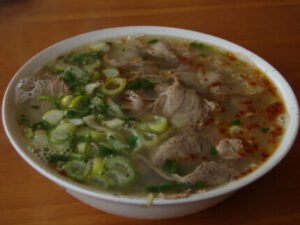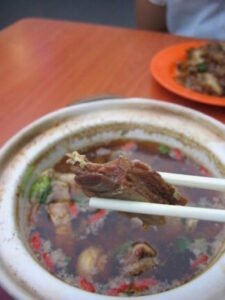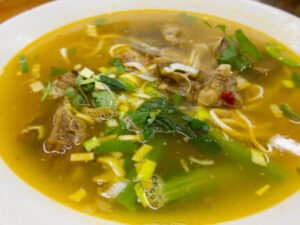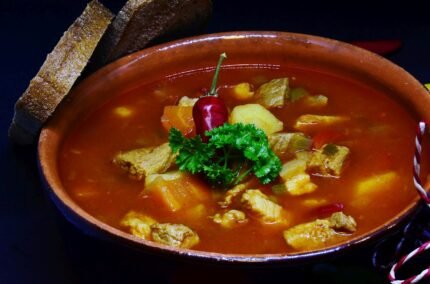Medically reviewed by Dr. Ramesh Gaddam, M.D. — Written by Sumalatha, D.N.H.E
Paya refers to trotters, specifically the feet of animals, usually lamb or goat, in the context of culinary usage. Paya is commonly used to make a hearty and flavorful soup called paya soup. The trotters are slow-cooked with various spices and herbs, resulting in a rich and nutritious broth. This dish is popular in South Asian cuisines and is known for its distinctive taste and gelatinous texture.
Paya Soup Benefits

Paya soup is believed to offer several potential health benefits:
Joint Health:
The slow-cooked trotters in paya soup release collagen, which is beneficial for joint health. Collagen is a protein that supports the structure of joints, cartilage, and tendons.
Nutrient-Rich Broth:
The broth in paya soup is infused with minerals, vitamins, and nutrients from the bones and spices, contributing to its nutritional value. It may include elements like calcium, magnesium, and phosphorus.
Digestive Aid:
The gelatinous texture of the soup may help soothe and support the digestive system. It is often considered easy to digest, making it suitable for individuals with digestive issues.
Boosting Immunity:
The spices and herbs used in paya soup, such as ginger and garlic, are known for their potential immune-boosting properties. They may provide antioxidants and other compounds that support the immune system.
Hydration:
The broth in paya soup contributes to overall hydration, which is essential for various bodily functions.
It’s important to note that while paya soup can be nutritious, individual health benefits may vary, and it should be part of a balanced diet.
Additionally, people with specific dietary restrictions or health conditions should consult with a healthcare professional before making significant changes to their diet.
Goat Paya Soup Nutrition
Goat paya, also known as goat trotters or goat feet, is a dish made from the feet of goats. It is a popular delicacy in many South Asian and Middle Eastern cuisines. While specific nutritional content can vary based on the preparation and ingredients used, here are some general nutritional aspects of goat paya:

Protein:
Goat paya is a good source of protein, which is essential for muscle building, repair, and overall body function.
Collagen and Gelatin:
The connective tissues and bones in goat paya contain collagen and gelatin. These substances are beneficial for joint health, skin, hair, and nails.
Minerals:
Goat paya can provide essential minerals like calcium, phosphorus, magnesium, and potassium. These minerals are vital for bone health, nerve function, and electrolyte balance.
Vitamins:
The preparation may include various spices and herbs that contribute to the overall nutritional profile. Additionally, goat paya can contain B-vitamins, such as B12, which is crucial for energy metabolism.
Healthy Fats:
While the fat content may vary based on the cooking method and specific ingredients, goat paya can provide healthy fats that are beneficial for overall health.
It’s important to note that the specific nutritional composition can vary based on the recipe, cooking methods, and ingredient choices.
For precise information, it’s recommended to refer to a specific recipe or use a nutritional analysis tool based on the ingredients and portion sizes you plan to use.
Paya Soup Calories
The calorie content in a serving of paya soup can vary based on factors such as the specific recipe, ingredients used, and serving size.
Typically, a bowl of paya soup might range from 150 to 300 calories per serving, but this is a general estimate.
For precise information, it’s advisable to refer to a specific recipe or use a nutritional analysis tool based on the ingredients and portion sizes you intend to use.
Paya Soup Protein
Disadvantages of Paya Soup
While paya soup is generally considered nutritious and beneficial for health, there are a few considerations and potential side effects:

High Cholesterol:
Due to the presence of meat and bones, paya soup may contain high levels of cholesterol and saturated fats. Individuals with concerns about cholesterol levels or heart health should consume it in moderation.
Sodium Content:
The broth in paya soup can be salty, depending on the amount of salt used during preparation. Excessive sodium intake may contribute to high blood pressure, so individuals on a low-sodium diet should be cautious.
Food Allergies:
Some people may be allergic to specific ingredients used in the soup, such as spices or herbs. It’s important to be aware of individual allergies and avoid ingredients that may trigger allergic reactions.
Gout:
The high purine content in meat may be a concern for individuals with gout, a type of arthritis. Excessive consumption of purine-rich foods may exacerbate gout symptoms.
Digestive Sensitivity:
The gelatinous texture of paya soup may be challenging for individuals with sensitive digestive systems. It’s advisable to introduce such foods gradually and observe how your body responds.
As with any food, moderation is key, and individuals with specific health concerns or dietary restrictions should consult with a healthcare professional or nutritionist before including paya soup in their diet.
Paya Soup benefits for weight loss
Paya soup may have some potential benefits for weight loss, but it’s important to note that it should be considered as part of a balanced and varied diet. Here are some aspects that may contribute to its potential benefits for weight loss:

High Protein Content:
Protein is known to be a satiating nutrient, meaning it can help you feel fuller for longer. Paya soup, being rich in protein from the meat and collagen in trotters, may contribute to increased satiety and reduced overall calorie intake.
Low in Calories:
Depending on the specific recipe and portion size, paya soup can be relatively low in calories. Choosing nutrient-dense, low-calorie foods can support weight loss by helping to create a calorie deficit.
Nutrient Density:
Paya soup contains various nutrients, including minerals and vitamins, which contribute to overall nutrition. A well-nourished body is more likely to function optimally, potentially aiding in weight management.
Slow Digestion:
The gelatinous nature of the soup may slow down digestion, potentially helping to stabilize blood sugar levels and reduce the likelihood of overeating.
While paya soup can be a nutritious addition to a weight loss diet, it’s crucial to consider the overall dietary context. Weight loss is best achieved through a combination of a balanced diet, regular physical activity, and lifestyle changes.
Additionally, individual responses to foods can vary, so it’s recommended to consult with a healthcare professional or a registered dietitian to create a personalized and effective weight loss plan.
Paya soup benefits for skin
Paya soup may offer some potential benefits for the skin due to its collagen content and other nutritional components. Here are ways in which paya soup may contribute to skin health:
Collagen Support:
Collagen is a protein that provides structure to the skin, helping maintain its elasticity and firmness. The collagen found in paya soup, derived from the connective tissues in the trotters, may support skin health and promote a more youthful appearance.
Gelatin Content:
The gelatinous nature of paya soup, derived from the collagen, can contribute to skin hydration. Adequate hydration is essential for maintaining skin elasticity and preventing dryness.
Vitamins and Minerals:
Paya soup may contain various vitamins and minerals, such as zinc, which play roles in skin health. Zinc, for example, is known for its potential to support wound healing and maintain the integrity of the skin.
Anti-Inflammatory Properties:
Some of the spices and herbs used in paya soup, such as ginger and garlic, have anti-inflammatory properties. Reduced inflammation can contribute to healthier skin.
Nutrient Density:
The overall nutrient density of paya soup may contribute to general well-being, which can indirectly reflect on the health of the skin. Nutrient-rich foods are important for overall skin health and appearance.
It’s important to note that while paya soup may provide certain nutrients beneficial for the skin, individual responses to foods can vary.
Additionally, a holistic approach to skincare, including a well-balanced diet, hydration, and proper skincare practices, is crucial for maintaining healthy skin.
If you have specific skin concerns, it’s advisable to consult with a dermatologist or healthcare professional for personalized advice.
Paya soup benefits for lungs
While paya soup is not specifically known for targeting lung health, it does offer some potential benefits that could indirectly support overall respiratory well-being. Here are a few aspects of paya soup that may contribute to potential benefits for the lungs:
Nutrient Content:
Paya soup is rich in nutrients, including vitamins and minerals, which play roles in overall health. Adequate nutrition supports the functioning of various organs, including the lungs.
Collagen for Tissues:
The collagen content in paya soup, derived from the connective tissues in the trotters, may contribute to the health of lung tissues. Collagen is a structural protein that supports the integrity of various tissues in the body.
Anti-Inflammatory Properties:
Some of the spices and herbs used in paya soup, such as ginger and garlic, have anti-inflammatory properties. Chronic inflammation is linked to various respiratory conditions, and reducing inflammation may have positive effects on lung health.
Hydration:
The broth in paya soup contributes to overall hydration. Proper hydration is important for maintaining the mucous membranes in the respiratory tract, which can help support lung function.
While these potential benefits are positive, it’s important to note that paya soup should not be considered a sole remedy or treatment for lung conditions.
Individuals with specific respiratory concerns should consult with a healthcare professional for proper diagnosis and treatment.
A balanced diet, regular exercise, and avoidance of smoking and other respiratory irritants are crucial components of maintaining lung health.
Paya Soup benefits during pregnancy
Paya soup can offer several potential benefits during pregnancy, but it’s important to ensure that it is prepared and consumed in a safe and hygienic manner. Here are some ways in which paya soup may be beneficial during pregnancy:
Rich in Nutrients:
Paya soup contains a variety of nutrients, including protein, iron, calcium, and other minerals. These nutrients are important for the overall health and development of both the mother and the developing fetus.
Collagen for Connective Tissues:
The collagen content in paya soup, derived from the trotters, may contribute to the development of the baby’s connective tissues, including bones, cartilage, and skin.
Hydration:
The broth in paya soup contributes to overall hydration, which is essential during pregnancy. Proper hydration supports amniotic fluid production, blood volume expansion, and helps prevent dehydration-related issues.
Protein for Fetal Development:
Protein is crucial for the development of the baby’s tissues and organs. Paya soup, being a good source of protein, can contribute to meeting the increased protein needs during pregnancy.
Iron Content:
Iron is important for preventing and treating anemia, a common concern during pregnancy. The iron content in paya soup may help support healthy blood development.
Digestive Comfort:
The gelatinous nature of paya soup may be soothing to the digestive system, which can be particularly beneficial for pregnant women who may experience digestive discomfort.
It’s essential to note that pregnant women should pay attention to food safety practices. Make sure that the meat and other ingredients are fresh, properly cooked, and free from contamination to prevent foodborne illnesses.
However, individual dietary needs and tolerances can vary, and it’s always advisable for pregnant women to consult with their healthcare provider or a registered dietitian to ensure that their dietary choices align with their specific health conditions and requirements during pregnancy.
Is Paya Soup good for heart patients?
Medically reviewed by Dr. Ramesh Gaddam, M.D.

General Physician, Diabetologist, and Critical Care Specialist.
Discover more from Health Build-Up
Subscribe to get the latest posts sent to your email.
